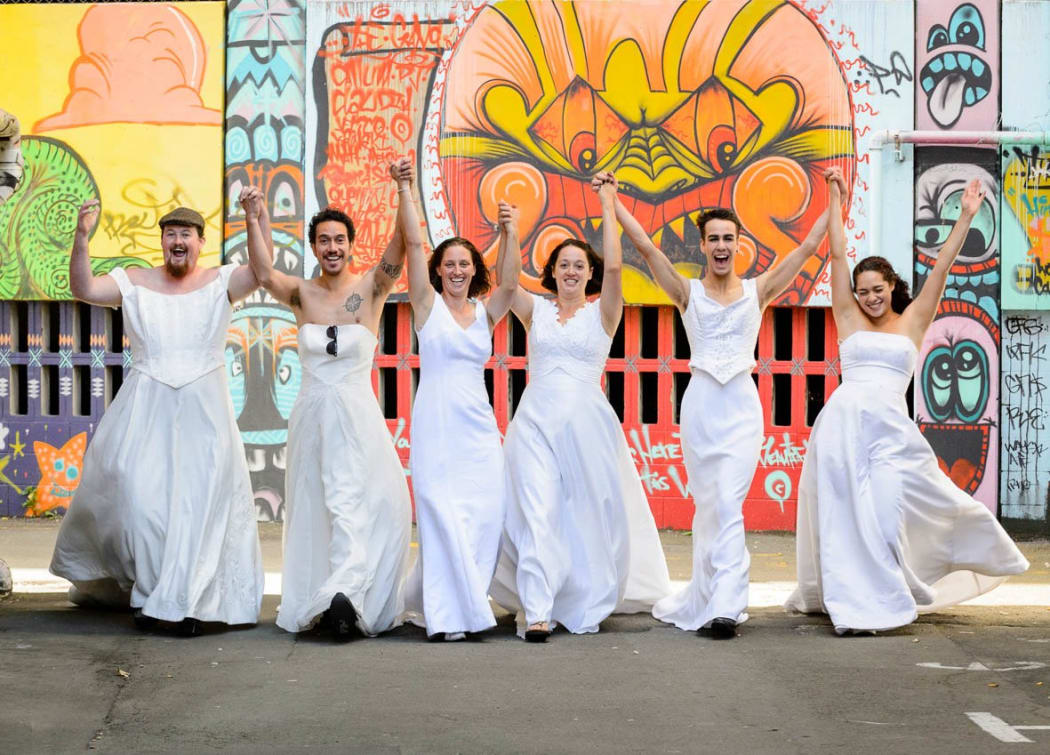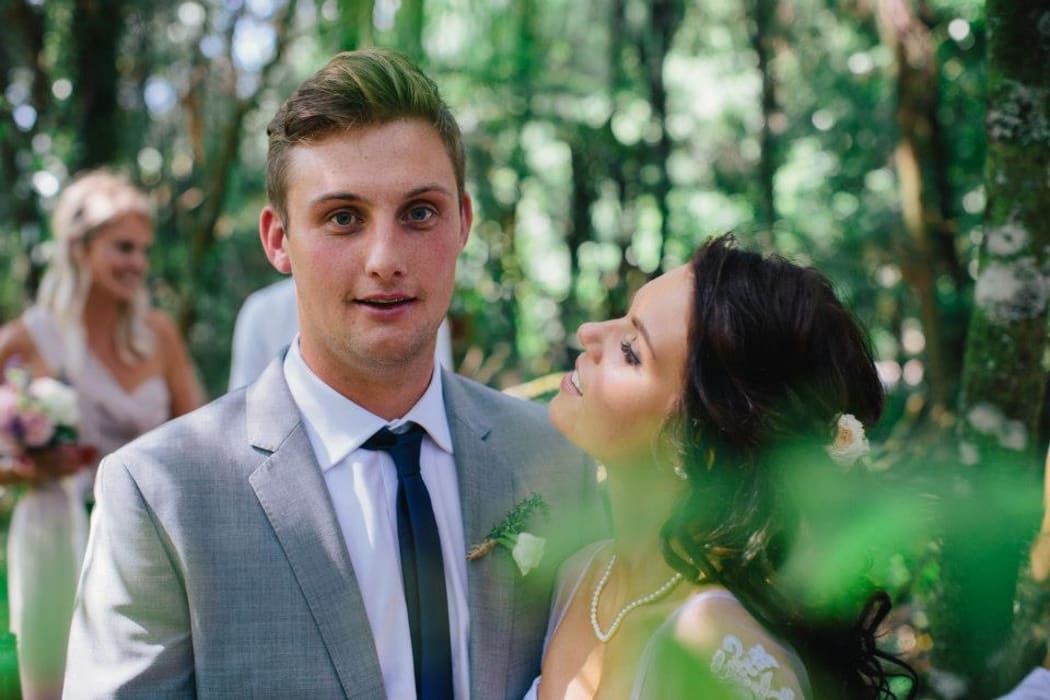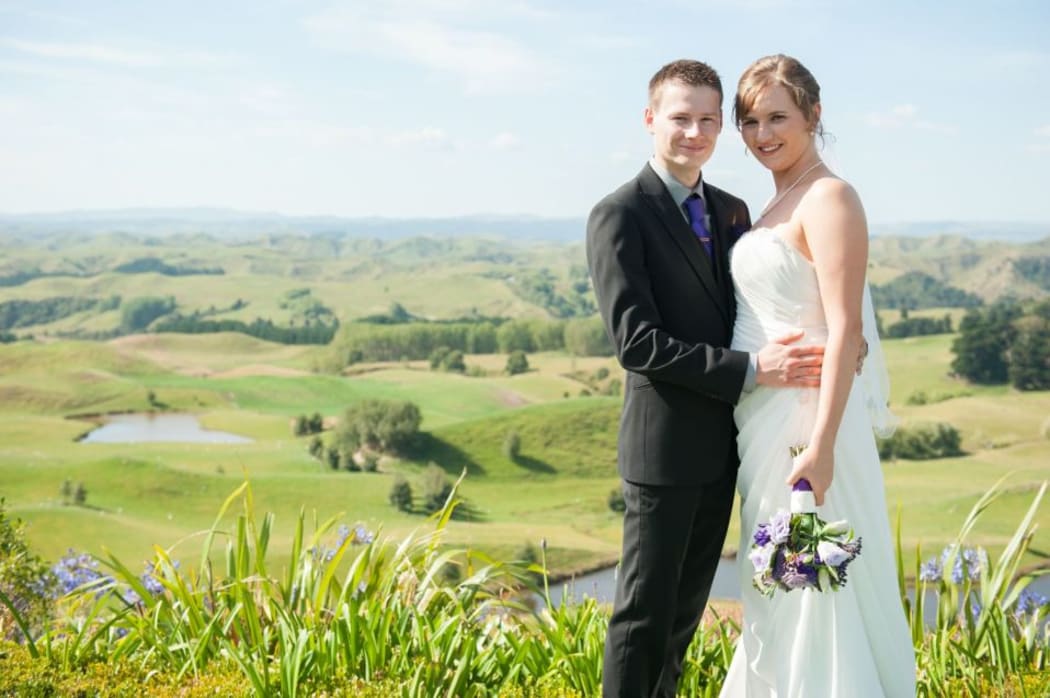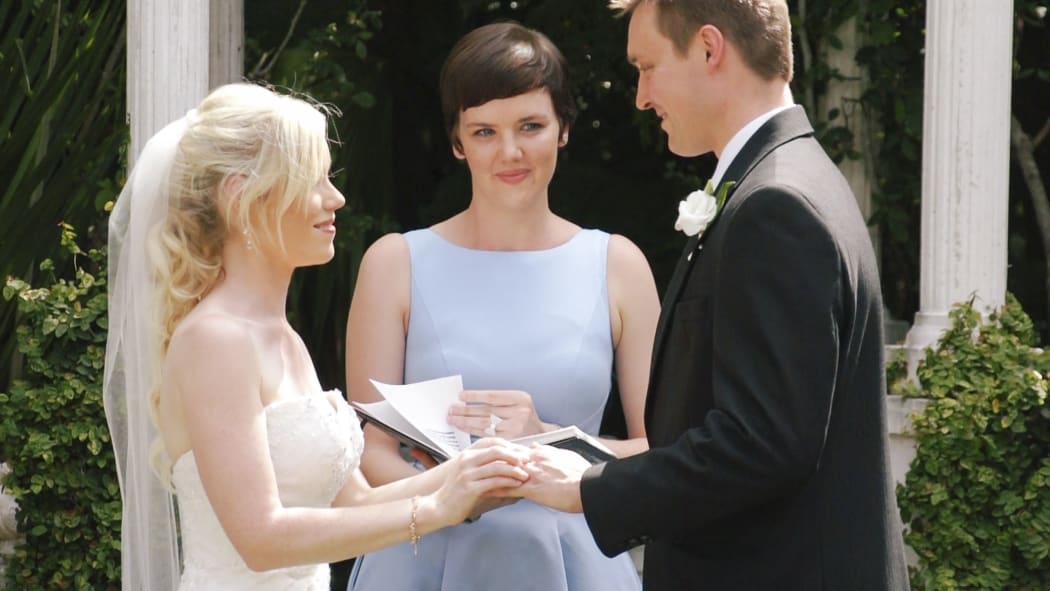Anya Tate-Manning, 33, has been with her partner, James, for “about five years” now. That she has to stop and think about it for a moment, counting backwards to when they first got together, is telling of their level of commitment – there’s no self-conscious mental tallying of months like there is by those on their toes in the first throes of a new relationship.
But like many people her age, she sees no real need to get married. Both she and James are children of divorce; her parents opted to get hitched in a registry office over a white wedding. “I don’t know if it matters much to me,” she says.
The hundred-odd wedding dresses she keeps in boxes piled high in her living room tell a different story.
They’re leftover from Brides: A Dress-up Conversation, an “interactive theatre” project Tate-Manning and a collaborator, Barbarian Production’s Jo Randerson, held in Wellington last year. It ran in an empty shop across the road from the Beehive for two weeks in April, happily coinciding with the passing of marriage equality. Their aim was to generate discussion about the meaning of marriage in a time when one in three end in divorce.

Anya Tate-Manning, third from right, of Brides: A Dress-up Conversation Photo: Mark Coote
The institution has taken a hit in the past 40-odd years. Fewer people are getting hitched, and those that are do so later in life. In 1971, when the general marriage rate in New Zealand peaked at 45.5 per 1000 people, the median age at first marriage was about 23 for men, and 21 for women. In 2012, it was 30 for men, and 28.5 for women. All signs point to marriage being just not as much of a priority for young people – or anyone – today as it once was.
But having sat in on 100-odd interviews about the meaning of marriage, most of them with people in their twenties, Tate-Manning was surprised by their optimism – even outright enthusiasm – about the idea. It contrasted starkly with her own views as a young adult living in Dunedin in the early 2000s.
“It might just have been me and my mates, but we were very anti-marriage,” she remembers. “We never thought it was a necessary thing to do. The impression I got from talking to a lot of younger people was that it’s a bit more in vogue now.”
There has been a slight rise in the number of couples tying the knot here in the past couple of years, in part because of the passage of marriage equality. It reflects US research that shows most “Millennials” do value marriage – more than they do career and financial success, in fact – and would like to tie the knot one day.
Their reluctance to rush to the altar has a lot to do with the state of the economy and the job market. Many, especially those with lower levels of income and education, see a solid economic foundation as a necessary prerequisite to marriage. And as they put off making inroads in their careers in favour of higher study, retraining, changing jobs, or going overseas, that kind of financial stability isn’t often achieved much before they reach their late 20s.
Plus, there’s increasing acceptance that you don’t need to be married to be in a long-term, committed relationship, or to have kids, or to buy a house. This generation is making its important life decisions later, if at all – there just isn’t a blueprint anymore.
VIDEO: Ana Ames-Durey wants to get married, but sister Amy thinks it's “completely unnecessary”
“There’s a romantic hope that those things will happen in that order, but I think people are realising that you’ve got to be flexible,” says Laura Giddey, 25 – who is, to her knowledge, the youngest celebrant in the country. She’s married 10 couples, most of whom have been in their mid to late twenties. “You could meet somebody who’s already been married, or who has kids. You’ve got to be open to things looking a little different to how you imagined.”
But the number of possible paths means getting hitched young can sometimes carry a stigma. (“When you hear of a high school friend getting married, your first thought is, ‘Are they Christian?’ and the second is, ‘Are they pregnant?’” said a friend, upon hearing of this feature.)
Esther Goh, 25, didn’t think she’d get married until she was at least 30, but she married her partner last May, after a two-year engagement. She said reaching the point where she felt “emotionally ready” for the commitment was a “slow, gradual process”.
“I sometimes hear people say in relation to getting married, ‘we just knew’, or if they got married young, ‘there was no point waiting’, but I can’t relate to that at all,” she says. “It was less about fear of commitment and more struggling with labels: was I ready to identify as a ‘wife’? … I honestly think I struggled more with the idea than the people around us did. It didn’t fit with my original life plan.”
Has she ever wondered if she’s missing out? Definitely, she says. “But realistically, my life would be more Gilmore Girls than Sex and the City – so no.”
And getting married doesn’t have to mean settling down. Jaime King, 21, has been married for just over a year. She met her now-husband at a gig in their hometown of Taupo in early 2010. At the time, she was a 17-year-old student, and he was 22.

Sam and Jaime King at their wedding Photo: Andrew Hewson / Grey Area Productions
They spent much of their first year as a couple in a long-distance relationship as Sam studied at a bible college in California. “After nine months, I said, ‘Hey, I know we’re only young, but if you’re going to go back to America to finish your study, we can’t really be together. It’s not going to work’,” says Jaime.
He returned to New Zealand to be with her, and they got engaged. “It sounds so stupid saying to someone I don’t know why I got married, but Sam didn’t want to live with me if we weren’t.”
Though she herself is not religious, she didn’t see it as an ultimatum. “I just wanted to be with him. We could’ve waited a few more years, but I was like, ‘let’s get on with it’. … I guess I’ve always liked the idea of doing it ‘the right way’, even though there is no right way.”
Her family were not impressed. “Initially, they were like, ‘Are you sure you want to do this? What happens if you don’t get on?’ And I think being so young and naïve, I was like, ‘No, this is what I want to do, you can’t change my mind’.”
There’s plenty she loves about married life, but it’s been a tough first year, not least because they both started their own businesses within three months of getting hitched: Sam set up a café, and Jaime, a music school.
Juggling those commitments and their respective career goals has proved challenging, she says, and the couple are right now working out their next step. “I would resent Sam and our marriage if I didn’t do what I really wanted to do.”
She thinks there’s a misconception that marriage means “settling down, having children, being boring”. “I want to snowboard the world with Sam; I want to have a successful music career; I want to get registered as a teacher; I think I want to go into the army; I want to do Ironman. There’s so much … I want to tell my kids I’ve had adventures.”
“I see the effects of divorce everywhere I look, and that’s so sad”
Jaime accepts that there’s a chance that she and Sam might not be together forever, but is scathing of people who bring children into a union that’s doomed to fail. “I see the effects of divorce everywhere I look, and that’s so sad,” she says. “That’s also why I want to wait to have children – so that, if anything does happen in the next 10 years to destroy our marriage, I can just take my fur babies and run. I hope I never have to.”
Though the divorce rate has declined since the peak of 1981-2, just over one-third of New Zealanders who married in 1987 had divorced before their 25th wedding anniversary. As such, many young people have seen their parents’ relationships dissolve – a fact perhaps reflected in the growing proportion of couples living together in de facto relationships.
Eleanor Barker, 24, lives with her partner, but identifies as being explicitly anti-marriage in part because of her parents’ failed relationship. She sees it as an unnecessary check on her ambition and thirst for “life experience”, as well as a barrier to an amicable break-up.
“I would like to be with my current partner for the foreseeable future, but I’d also like to be able to part ways with him as ‘easily’ as possible, if things are no longer mutually beneficial,” she says. “It would be difficult enough as we live together and obviously love each other very much.”

Caitlin Neal and her husband Matt at their wedding at Orlando Country Estate Photo: Laura Ridley / Laura Ridley Photography
De facto relationships can be just as secure, committed and recognised as any marriage – and, when most couples have lived together before tying the knot, there’s little to differentiate the two. After she married her “high school sweetheart” in January, Caitlin Neal, 21, of Palmerston North was most surprised by how little life changed.
“It’s actually not a hell of a lot different to living together normally; I just have a different name now” she says. “Everyone’s like, ‘That’s such a big step’, and I had a little bit of a freak out before I walked down the aisle, but … we still live together, we still argue, we’re still best friends.”
It’s fair to ask, if there is so little difference between a de facto couple and a married one, why get hitched at all. Celebrant Laura Giddey says the concept is “traditional”, even “patriarchal”, but it’s also “hopeful and romantic and idealistic” – and that continues to resonate with people.
“There’s a feeling like it’s really set in stone when you marry them … Once you give these vows in front of all your friends, everybody’s heard you. There’s that accountability that people want to hold on to, even if they don’t think they’re being traditional.”
The average wedding costs about $30,000 – equivalent to a down payment on a house.
The day itself, she says, is a celebration of a couple’s commitment to one another, shared with their friends and family. A trend she’s observed is having photos taken before the ceremony, so the couple can spend more time with their guests. “They really value the fact that all their favourite people are at this celebration of the two of them.”
But the average wedding costs about $30,000 – equivalent to a down payment on a house, another comparable goal for a couple in their twenties. People feel under a lot of pressure to have their special day look a certain way, says Giddey, who blames it on social media.
“There’s so many ways you can do it cheaper, but I think Pinterest, Facebook and Instagram have made people so anxious about this thing they have to present to the world that they feel like they have to spend five years saving for it.”

Celebrant Laura Giddey marries Gavin and Nikkki Neale Photo: Indigo Moon Productions
All you really need is a celebrant; everything else about the ceremony is up to you. You don’t have to be given away by your dad, or take your husband’s name. The maid of honour and the best man don’t have to be the witnesses. You don’t have to leave on your honeymoon straight away. “There’s just so many things we assume are the way you have to do things,” says Giddey. “People still buy into it.”
The real work begins after the ceremony. Giddey worked as a youth pastor for three years, and says Christian couples seem to be offered more support in the lead-up to marriage than secular couples making the same commitment – perhaps because tying the knot at a young age is more common in that community.
Counselling, even at the engagement stage, has become “quite cool in Christian circles” as a means of unpacking individuals’ expectations and preparing them for married life. “It doesn’t have to be a religious thing; it’s just a tool that sort of helps you think about finances, and those types of things – the stuff you fight about.”
Though they’re reluctant to describe themselves as a “religious couple”, Beka and Derek Radford of Hamilton are open about the fact that if it weren’t for their faith, they’d be living together in a de facto relationship right now. As it was, they got engaged with the support and blessing of both their families.
“A marriage problem is ‘what toothpaste are we going to use?’ There’s really no such thing.”
Before their wedding day, they were mentored by an older married couple about what kind of family culture they might like to create together. After two years of marriage, they try to eat dinner at the table, and spend alternate Christmases with each set of parents.
“You get used to that form of discussion: what are your expectations, what are mine,” says Derek. “A marriage problem is ‘what toothpaste are we going to use?’ There’s really no such thing. Two people, with individual problems, bring them to a marriage, and you have to work through those.”
And it’s hard – they both agree. In their first year of marriage, Beka’s father died; she finished her degree; Derek started his first job; they travelled to Vietnam; they bought a house together. “We’ve experienced a lot of hard times so far – a lot of times people our age haven’t experienced yet,” says Beka. “Your life doesn’t stop when you get married.”
They’re the first to admit that married life isn’t for everybody, but a big part of the excitement for them is in planning the rest of their lives together. They’re saving for a big OE next year, and want to move to London. “I just want to have life experiences with my best friend,” says Beka. “We talk about future plans with each other. … It’s exciting to dream with one person. We’re not planning to start being old.”
“There’s a degree of security in the fact that you are with one person,” says Derek. “You’re able to relax – not be lazy, but relax.”
The institution of marriage has taken some hits in the past couple of decades as people choose to live in de facto relationships, remain single, or put it off until later in life. But the upshot is it’s been stripped of its more traditional trappings. With couples able to achieve the same security and recognition in de facto unions, you could argue that marriage, to the Millennial generation, is more idealistic and meaningful as an expression of commitment – whether or not it extends ‘til death do they part.

